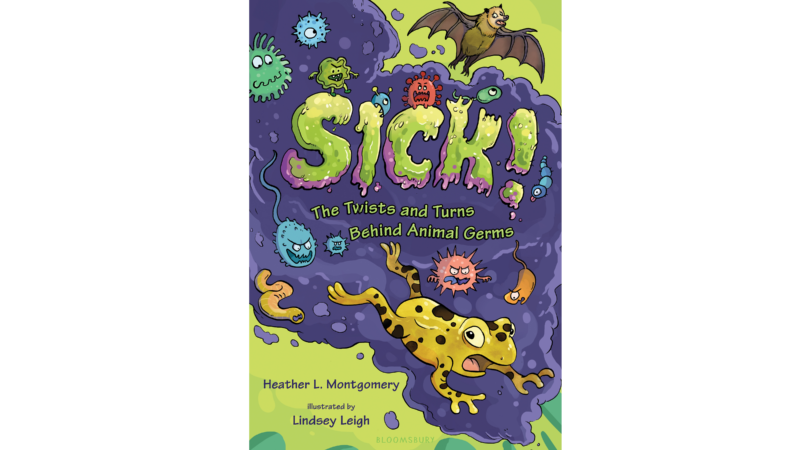‘Sick!’ New kids book by Alabama author explores how animals fight germs
As an environmental educator, Heather Montgomery spends a lot of time thinking about wildlife. So in 2020, when COVID-19 swept the globe, Montgomery “turned to the animals for answers.”
“I went out in the woods,” she said, “and it dawned on me that every species that surrounded me had survived a pandemic at one point through history, and I wondered, ‘How?’”
That inquiry became the subject of her new children’s book, Sick! The Twists and Turns Behind Animal Germs. It’s a series of stories about how animals fight off all kinds of pathogens, from chimpanzees that get rid of parasites to alligators that combat deadly bacteria.
Montgomery was especially curious about the germ-fighting abilities of vultures.
“How in the world does a vulture not vomit?” she said. “Literally, they’re putting their head in dead, decaying, disgusting stuff.”
Montgomery explored the mystery in chapter five, Buzzard Buddies, which details the research of a scientist who has spent years studying vultures. Each chapter follows a similar format, taking readers through the meticulous process of forming a hypothesis and searching for answers.
“As I dug into the fun facts, I got as interested in the scientists’ story,” Montgomery said, noting that she interviewed researchers from around the globe while writing her book. “Talking to the scientists is phenomenal. Many of them are excited to share.”
Sick! is the seventh publication for Montgomery, who lives in north Alabama. Her previous titles explore topics including roadkill, bug parenting and animal poop. This time around, Montgomery included comic strips to help break down the complicated topics of pathogens and infectious disease.
“I do like to dive into the details,” she said. “And I’m not really scared to share with kids the complex things, because kids are smart.”
Montgomery said she learned a lot while researching and writing Sick! She was especially amazed by the surprising benefit of microbes and how they can help species adapt over time.
“I never really thought about it, that basically germs drive evolution,” she said. “Blew my mind.”
While she doesn’t expect every reader to remember every detail, Montgomery hopes people finish her books feeling excited about science.
“I want to leave questions, because we’re curious people and that’s fun,” she said.
Sick! The Twists and Turns Behind Animal Germs is available Tuesday.
Forget the State of the Union. What’s the state of your quiz score?
What's the state of your union, quiz-wise? Find out!
A team of midlife cheerleaders in Ukraine refuses to let war defeat them
Ukrainian women in their 50s and 60s say they've embraced cheerleading as a way to cope with the extreme stress and anxiety of four years of Russia's full-scale invasion.
Nancy Guthrie case: How do families of missing people cope with the uncertainty?
When a loved one goes missing, relatives can feel guilty simply for eating, says Charlie Shunick, whose sister was kidnapped. Shunick now helps others navigate a nightmare "nobody is prepared for."
As the U.S. celebrates its 250th birthday, many Latinos question whether they belong
Many U.S.-born Latinos feel afraid and anxious amid the political rhetoric. Still, others wouldn't miss celebrating their country
US military used laser to take down Border Protection drone, lawmakers say
The U.S. military used a laser to shoot down a Customs and Border Protection drone, members of Congress said Thursday, and the Federal Aviation Administration responded by closing more airspace near El Paso, Texas.
Deadline looms as Anthropic rejects Pentagon demands it remove AI safeguards
The Defense Department has been feuding with Anthropic over military uses of its artificial intelligence tools. At stake are hundreds of millions of dollars in contracts and access to some of the most advanced AI on the planet.







